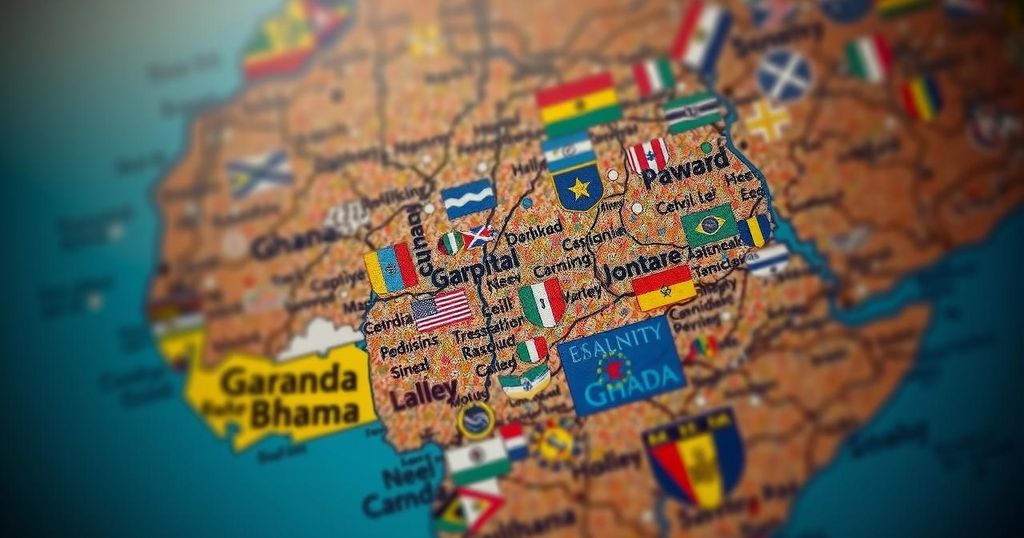Ghana’s Upcoming Elections Highlight Economic Struggles and Desire for Change

Ghana’s December 2023 elections are characterized by a fierce competition between former President John Mahama and current Vice President Mahamudu Bawumia. Economic recovery, inflation, and unhappiness with traditional parties are central voter concerns as they express a desire for change. The elections are set against a backdrop of economic difficulties stemming from a significant debt default and global disruptions in grain supply.
In anticipation of the highly competitive elections scheduled for December 7, Ghana is witnessing a fervent political landscape. The two leading candidates are former President John Mahama of the National Democratic Congress (NDC) and current Vice President Mahamudu Bawumia of the New Patriotic Party (NPP). Mahama aims to create a 24-hour business environment to stimulate job growth and enhance the economy, which is still recovering from a significant $30 billion external debt default in 2022. Conversely, Bawumia acknowledges the challenges stemming from the post-COVID era and is committed to economic revitalization.
Political discourse in Ghana has long been dominated by the NDC and the NPP, making it challenging for smaller parties to gain traction. University of Ghana senior lecturer Kwame Asah Asante underscores this point, noting that since 1992, minor parties have failed to secure more than five percent of the vote. Current electoral sentiments, however, indicate a growing desire for change among voters, with some expressing fatigue regarding the longstanding dominance of the two major parties.
Many voters in Accra, the capital, are contemplating alternatives. Angela Ofori, a voter, remarked, “Since 1992 to this year, we haven’t changed parties … we want [to] change to [a] different party so that we would see more improvements.” The presence of independent candidates, such as Nana Kwame Bediako, popularly known as Cheddar, has been noted, although his impact appears limited in this election cycle.
The backdrop of these elections is marked by economic hardships. Ghana, the world’s second-largest cocoa producer, faced significant challenges due to a debt default and rising inflation reaching historic highs. The war in Ukraine further disrupted grain supplies, exacerbating food scarcity in the region. Asante emphasizes the pivotal role of the economy in these elections, stating, “The economy will play an important role because it’s a bread-and-butter issue.”
Further complicating the electoral landscape is the issue of illegal mining, which threatens both the environment and agricultural production. Many voters, such as Wisdom Gavor and Janet Bawah, express a desire for change, seeking leadership under Mahama, who promises an economic framework that could enhance job prospects. In contrast, some supporters remain loyal to the NPP, commending Bawumia’s digitization policies as a significant step toward modernizing Ghana’s economy and improving efficiency.
Ghana is generally recognized as a stable democracy within a region that has experienced political upheaval. While various polls indicate a close race, the upcoming election is poised to be fiercely contested, representing a critical juncture in the nation’s political evolution.
Ghana has a longstanding political history characterized by the dominance of two major political parties: the National Democratic Congress (NDC) and the New Patriotic Party (NPP). For over three decades, elections have largely been a contest between these two forces, with little room for minor parties, which typically struggle to secure noteworthy representation. The political climate leading up to the December 2023 elections has been marked by economic challenges, including significant external debt, inflation, and food scarcity. As various candidates vie for the presidency, the electorate is increasingly voicing a desire for change, reflecting both economic grievances and growing disenchantment with the traditional party system.
The upcoming presidential elections in Ghana are set to be highly competitive, with former President John Mahama challenging current Vice President Mahamudu Bawumia. Economic issues, particularly related to inflation and strategic infrastructural development, are central to voters’ concerns. As political sentiments shift, there is a palpable call for alternatives beyond the traditional major parties, potentially reshaping Ghana’s electoral landscape. The outcomes of the elections are anticipated to reflect the electorate’s aspirations for change in governance and economic recovery.
Original Source: www.voanews.com








